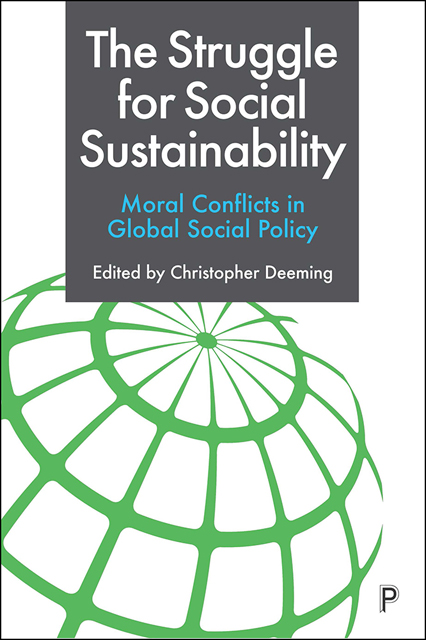Book contents
- Frontmatter
- Contents
- List of boxes, figures and tables
- List of abbreviations
- Notes on contributors
- Acknowledgements
- Preface
- 1 The ‘social’ in the age of sustainability
- 2 ‘No such thing as society’? Neoliberalism and the social
- 3 The social question: reconciling social and economic imperatives in policy
- 4 Disputing the economization and the de- politicization of ‘social’ investment in global social policy
- 5 The social dimension of sustainable development at the UN: from Brundtland to the SDGs
- 6 Paradigm lost? Blocking the path to ecosocial welfare and post- productivism
- 7 World population prospects at the UN: our numbers are not our problem?
- 8 Ageing sustainably
- 9 The political challenges to governing global migration and social welfare
- 10 Bringing in ‘the social’: an intersectional analysis of global crises and welfare
- 11 Global social policy and the quasi- concept of social cohesion
- 12 Putting the global in social justice?
- 13 ‘Go- social’? Inclusive growth and global social governance
- 14 For better or worse?
- 15 The struggle for social sustainability
- Index
13 - ‘Go- social’? Inclusive growth and global social governance
Published online by Cambridge University Press: 14 April 2023
- Frontmatter
- Contents
- List of boxes, figures and tables
- List of abbreviations
- Notes on contributors
- Acknowledgements
- Preface
- 1 The ‘social’ in the age of sustainability
- 2 ‘No such thing as society’? Neoliberalism and the social
- 3 The social question: reconciling social and economic imperatives in policy
- 4 Disputing the economization and the de- politicization of ‘social’ investment in global social policy
- 5 The social dimension of sustainable development at the UN: from Brundtland to the SDGs
- 6 Paradigm lost? Blocking the path to ecosocial welfare and post- productivism
- 7 World population prospects at the UN: our numbers are not our problem?
- 8 Ageing sustainably
- 9 The political challenges to governing global migration and social welfare
- 10 Bringing in ‘the social’: an intersectional analysis of global crises and welfare
- 11 Global social policy and the quasi- concept of social cohesion
- 12 Putting the global in social justice?
- 13 ‘Go- social’? Inclusive growth and global social governance
- 14 For better or worse?
- 15 The struggle for social sustainability
- Index
Summary
Introduction
This chapter addresses the prospects for improved social governance to tackle the global challenges of the 21st century, as humanity moves towards more sustainable patterns of consumption and production, and hopefully a more socially responsible, equitable, inclusive and just world. In particular, the chapter critically examines the emerging social policies being articulated by the Organisation for Economic Co-operation and Development (OECD) in an effort to reform global capitalism. This international organization (a rich-country club) has long been leading and coordinating policy efforts on the global stage, diffusing knowledge to member and non-member states alike with leading expertise to tackle the social, economic and governance challenges of the 21st century (Ougaard, 2010; Clifton and Díaz-Fuentes, 2011; Schmelzer, 2014). It is, at present, in the process of repositioning itself as the international institution responsible for promoting ‘global social justice’; although the issues and questions raised by this are complex, arguably much of it may be about representing a particular set of ‘Western values’ and a particular form of market ideology (see Chapters 6, 8, 11 and 12). Nevertheless, we find the OECD is now shaping important aspects of international governance and global social policy, which is the focus of this chapter, attempting to establish a new global social governance (GSG) architecture in an effort to tackle growing social inequality.
The idea of global social governance
There is no ‘world parliament’ or ‘global government’ (a government of the world) as such, at least at present (Monbiot, 2003; Weiss and Thakur, 2010; Leinen and Bummel, 2018), that can enact legislation in order to tackle the pressing global challenges of the 21st century. In this context, social scientists remain divided over whether a truly effective form of world government can realistically exist and how this can function in practice (Beeson, 2019: ch 10). The notions of ‘multi-level governance’ and ‘multilateralism’ continue to be most relevant, marred by uncertainty in the struggle for GSG, where the ‘economic’ and ‘social’ have long been separate spheres at the international level (O’Brien et al, 2000; Held, 2006; Weiss and Wilkinson, 2019). Governing the ‘social’ in a global context or GSG, then, as Bob Deacon (2003, 2007) observes, recognizes the multiple institutional levels shaping social policy in individual nation states, local, regional, sub-national to national government, to supra-national levels.
- Type
- Chapter
- Information
- The Struggle for Social SustainabilityMoral Conflicts in Global Social Policy, pp. 255 - 274Publisher: Bristol University PressPrint publication year: 2021



